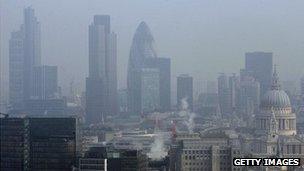Bank levy to rise as revenue falls short
- Published

Treasury officials say that they simply miscalculated how much borrowing foreign banks do in the UK
The government is set to increase the levy on bank borrowing in the UK again, because it has not raised enough money.
The rate will rise from the current 0.078% to 0.088% from January - a level that the Treasury thinks will yield the originally projected £2.6bn per year.
The widely expected decision was announced by Chancellor George Osborne in his Autumn Statement on Tuesday.
It follows the February scrapping of a lower phase-in rate, and an increase in the standard rate from 0.075% in March.
In its response to the Autumn Statement, the British Bankers' Association made a plea for stability.
"A stable tax regime is important," the banking lobby group said. "Banks of all nationalities do business around the world from here, and they pay tax here. Certainty is an important requirement."
Tax avoidance
Banks pay the tax on all their borrowing, except the first £20bn, and excluding ordinary deposits, which are guaranteed by the UK government, and borrowing secured on government debt.
Longer-term borrowing by banks benefits from a lower tax rate.
In his Autumn Statement, the chancellor said the Treasury planned to prevent banks from using complex schemes designed to reduce the amount of the levy they must pay.
"We will also take action to stop some large firms using complex asset-backed pension funding arrangements to claim double the amount of tax relief that was intended," he said, claiming this would save the Treasury £500,000 per year.
Mr Osborne also repeated his opposition to a tax on financial transactions currently being proposed by the European Union.
"It is not a tax on bankers, it is a tax on people's pensions," he said.
His continued opposition to the tax - also known as the "Tobin tax" or "Robin Hood tax" - did not go down well with campaigners.
"This is an Autumn Statement for bankers," said David Hillman of the Robin Hood tax campaign. "The chancellor is asking teachers, nurses and poor people in work to pay the price for the economic crisis, while the City pays not a penny more.
"Bankers will breathe a collective sigh of relief that the chancellor went out of his way to promise to block a financial transaction tax that would make them pay their fair share towards cleaning up the mess they caused."
The chancellor also said in his statement that the government would publish next month its response to the Vicker's report on banking, which recommended among other things that the British banks' core UK activities be split off and ring-fenced from the banks' riskier international operations.
Miscalculation
The bank levy was introduced by the coalition government not only to raise money, but also to discourage banks from becoming overly dependent on short-term unguaranteed debts.
Such borrowing can quickly evaporate if the bank's lenders become nervous, leaving the bank in need of a government bailout to avoid collapse amid a financial panic, such as occurred in the 2008 financial crisis.
"An increase in the tax rate will hit the big British banks hardest, because - unlike their overseas rivals - the levy applies to all their borrowings, on a worldwide basis, not just their UK borrowings," notes BBC Business Editor Robert Peston.
It is unclear why revenues at the current tax rate have fallen short.
Foreign banks may have moved some of their UK borrowings offshore to avoid the tax.
UK banks have also been reducing their borrowing and lending activities in response to the stagnant economy and the eurozone debt crisis.
They may also have been cutting their borrowing and lending as a result of regulatory requirements for them to hold more capital (their capacity to absorb losses) relative to their total volume of lending.
However, Robert Peston understands that the main reason is that the Treasury simply miscalculated how much borrowing foreign banks have in the UK when it made its original projections.
Tom Aston, financial services tax partner at accountants KPMG, warned that some UK-based banks may consider relocating out of the UK, or scaling back their total lending within Britain, in response to the rising tax rate.
"The government's desire to maintain an annual bank levy take... may create the wrong incentives for bank lending," he said.
"If banks shrink their balance sheets then they will pay less bank levy, but typically at the same time they will be lending less to the economy.
"UK banks who remain here must be worried that they will be asked to pick up the bill for any large banks who decide to leave the country."